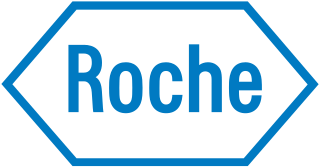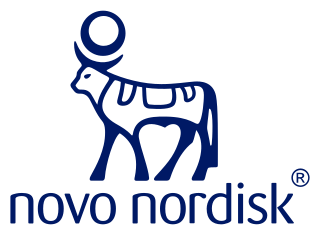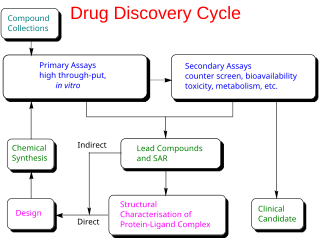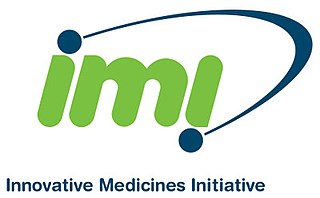
Novartis AG is a Swiss multinational pharmaceutical corporation based in Basel, Switzerland. Consistently ranked in the global top five, Novartis is one of the largest pharmaceutical companies in the world and was the fourth largest by revenue in 2022.
Schering-Plough Corporation was an American pharmaceutical company. It was originally the U.S. subsidiary of the German company Schering AG, which was founded in 1851 by Ernst Christian Friedrich Schering. As a result of nationalization, it became an independent company. In 1971, the Schering Corporation merged with Plough, Inc. to form Schering-Plough. On November 4, 2009 Merck & Co. merged with Schering-Plough with the new company taking the name of Merck & Co.

F. Hoffmann-La Roche AG, commonly known as Roche, is a Swiss multinational holding healthcare company that operates worldwide under two divisions: Pharmaceuticals and Diagnostics. Its holding company, Roche Holding AG, has shares listed on the SIX Swiss Exchange. The company headquarters are located in Basel. Roche is the fifth-largest pharmaceutical company in the world by revenue and the leading provider of cancer treatments globally. In 2023, the company’s seat in Forbes Global 2000 was 76.
Sanofi S.A. is a French multinational pharmaceutical and healthcare company headquartered in Paris, France. The corporation was established in 1973 and merged with Synthélabo in 1999 to form Sanofi-Synthélabo. In 2004, Sanofi-Synthélabo merged with Aventis and renamed to Sanofi-Aventis, which were each the product of several previous mergers. It changed its name back to Sanofi in May 2011. The company is a component of the Euro Stoxx 50 stock market index. In 2023, the company’s seat in Forbes Global 2000 was 89.

Eli Lilly and Company, doing business as Lilly, is an American multinational pharmaceutical company headquartered in Indianapolis, Indiana, with offices in 18 countries. Its products are sold in approximately 125 countries. The company was founded in 1876 by Eli Lilly, a pharmaceutical chemist and Union Army veteran of the American Civil War for whom the company was later named.

Novo Nordisk A/S is a Danish multinational pharmaceutical company headquartered in Bagsværd with production facilities in nine countries and affiliates or offices in five countries. Novo Nordisk is controlled by majority shareholder Novo Holdings A/S which holds approximately 28% of its shares and a majority (77%) of its voting shares.
The International Council for Harmonisation of Technical Requirements for Pharmaceuticals for Human Use (ICH) is an initiative that brings together regulatory authorities and pharmaceutical industry to discuss scientific and technical aspects of pharmaceutical product development and registration. The mission of the ICH is to promote public health by achieving greater harmonisation through the development of technical guidelines and requirements for pharmaceutical product registration.
Toxicogenomics is a subdiscipline of pharmacology that deals with the collection, interpretation, and storage of information about gene and protein activity within a particular cell or tissue of an organism in response to exposure to toxic substances. Toxicogenomics combines toxicology with genomics or other high-throughput molecular profiling technologies such as transcriptomics, proteomics and metabolomics. Toxicogenomics endeavors to elucidate the molecular mechanisms evolved in the expression of toxicity, and to derive molecular expression patterns that predict toxicity or the genetic susceptibility to it.
C.H. Boehringer Sohn AG & Co. KG is the parent company of the Boehringer Ingelheim group, which was founded in 1885 by Albert Boehringer (1861–1939) in Ingelheim am Rhein, Germany. As of 2018, Boehringer Ingelheim is one of the world's largest pharmaceutical companies, and the largest private one. Headquartered in Ingelheim, it operates globally with 146 affiliates and more than 47,700 employees. Unlike most large pharmaceutical companies which are listed, the company is private and fully owned by the Boehringer, Liebrecht and von Baumbach families. The company's key areas of interest are: respiratory diseases, metabolism, immunology, oncology and diseases of the central nervous system. Boehringer Ingelheim is a full member of the European Federation of Pharmaceutical Industries and Associations (EFPIA). The corporate logo of Boehringer Ingelheim depicts a stylized rendition of the central section of the imperial palace of Charlemagne.

Drug development is the process of bringing a new pharmaceutical drug to the market once a lead compound has been identified through the process of drug discovery. It includes preclinical research on microorganisms and animals, filing for regulatory status, such as via the United States Food and Drug Administration for an investigational new drug to initiate clinical trials on humans, and may include the step of obtaining regulatory approval with a new drug application to market the drug. The entire process—from concept through preclinical testing in the laboratory to clinical trial development, including Phase I–III trials—to approved vaccine or drug typically takes more than a decade.

Servier Laboratories is an international pharmaceutical company governed by a non-profit foundation, with its headquarters in France (Suresnes).

The European Federation of Pharmaceutical Industries and Associations (EFPIA) is a Brussels-based trade association and lobbying organisation, founded in 1978 and representing the pharmaceutical industry operating in Europe. Through its membership of 36 national associations and 39 leading pharmaceutical companies, the EFPIA represents 1,900 European companies.

Merck Serono is a pharmaceutical company headquartered in Darmstadt, Germany, and a brand and division of Merck focused on biopharmaceuticals.

The Innovative Medicines Initiative (IMI) is a European initiative to improve the competitive situation of the European Union in the field of pharmaceutical research. The IMI is a joint initiative of the DG Research of the European Commission, representing the European Communities, and the European Federation of Pharmaceutical Industries and Associations (EFPIA). IMI is laid out as a Joint Technology Initiative within the Seventh Framework Programme. Michel Goldman was the first executive director, from September 2009 until December 2014.

Bayer AG is a German multinational pharmaceutical and biotechnology company and is one of the largest pharmaceutical companies and biomedical companies in the world. Headquartered in Leverkusen, Bayer's areas of business include: pharmaceuticals, consumer healthcare products, agricultural chemicals, seeds and biotechnology products. The company is a component of the EURO STOXX 50 stock market index.
Critical Path Institute (C-Path) is a non-profit organization created to improve the drug development process; its consortia include more than 1,600 scientists from government regulatory and research agencies, academia, patient organizations, and bio-pharmaceutical companies.

Nycomed is a Swiss pharmaceutical company. Nycomed was acquired by Takeda Pharmaceuticals in September 2011. Production was located in Norway, Denmark, Poland, Austria, Belgium, Germany, Estonia, India, Mexico, Brazil and Argentina. Head office is located in Zürich, Switzerland. Total revenue was €3,400 million in 2006 and the group had 12,000 employees then. The company awarded an annual prize totaling 20,000 euros to four excellent junior scientists at the University of Konstanz. Also, the award promoted the concept of scientific exchange and networking of its winners.

eTOX is a temporary consortium established in 2010 to share and use toxicology data. It is a pre-competitive collaboration which main goal is to create and distribute tools to predict drug side-effects based on pre-clinical experiments. Aims are a better in silico predictability of potential adverse events and a decrease of the use of animals in toxicological research. eTOX is funded by the Innovative Medicines Initiative (IMI).

The Faculty of Pharmacy, Universidade de Lisboa (FFUL) is a Portuguese public institution of higher education dedicated to education, research, knowledge transfer and continuing education in the fields of pharmacy, medicine, and pharmaceutical sciences.
The European Lead Factory is a public-private partnership that aims to accelerate early drug discovery in Europe. The European Lead Factory is funded by the Innovative Medicines Initiative and consists of a pan-European consortium that includes 7 pharmaceutical companies as well as partners from academia and small and medium-sized enterprises (SMEs).













